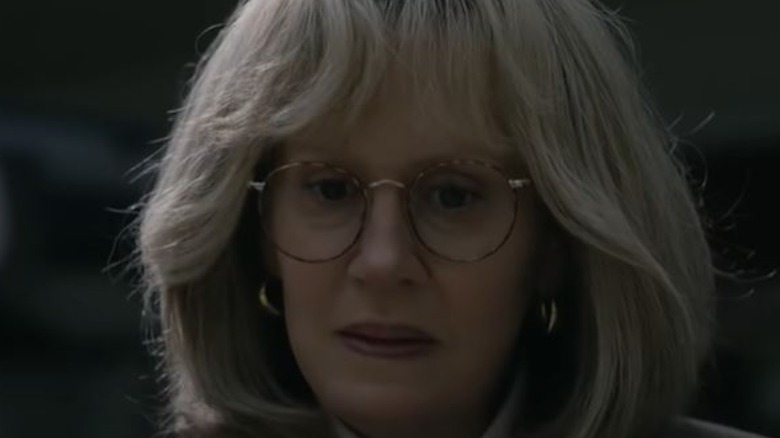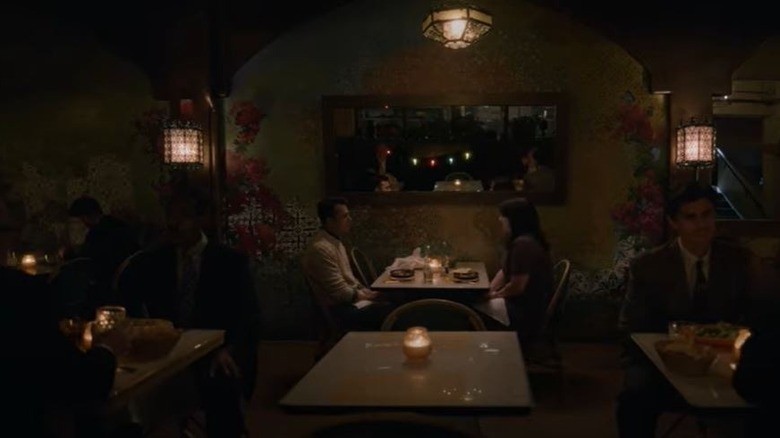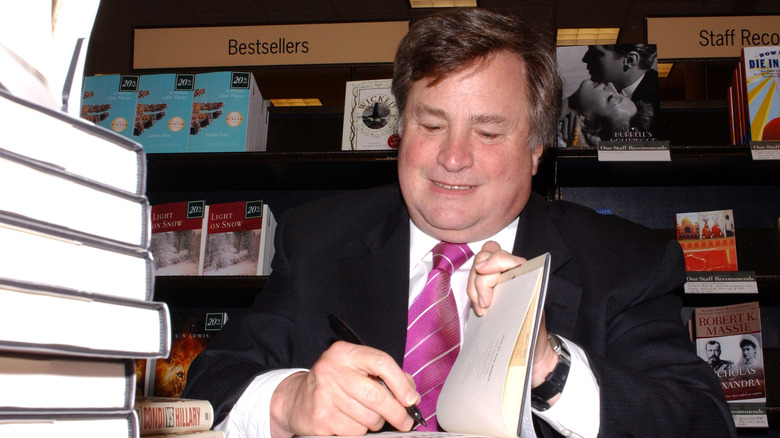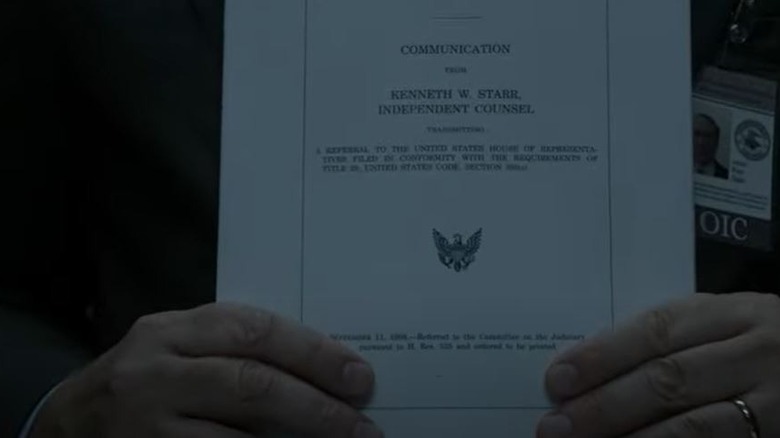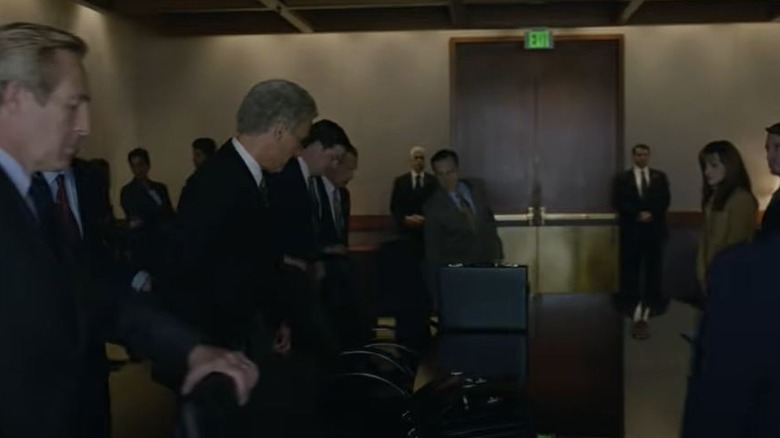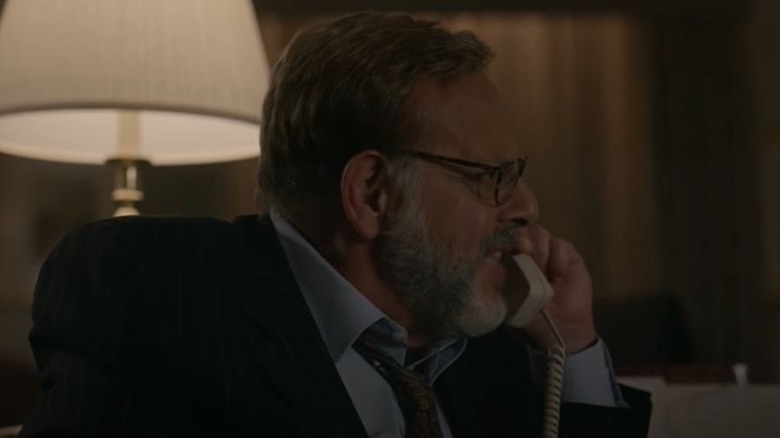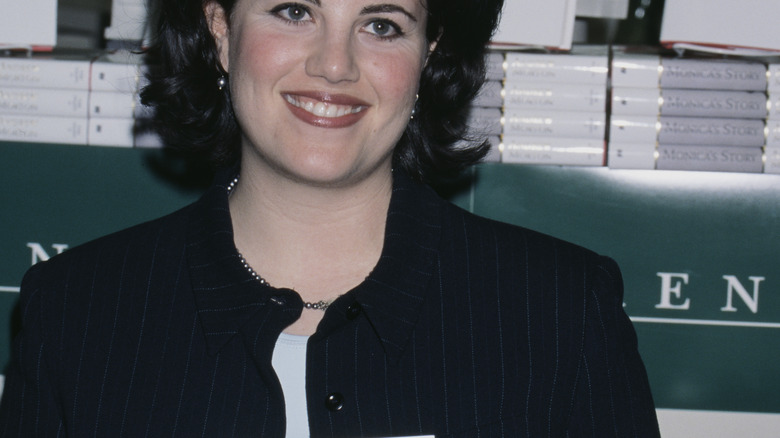Times Impeachment: American Crime Story Got Things Wrong
"Impeachment: American Crime Story" tackled the impeachment of one William Jefferson Clinton, President of the United States. The story was largely told from the perspective of Monica Lewinsky and Linda Tripp, but audiences were shown the story from every perspective — from Clinton's right wing opponents, to Kenneth Starr and his team, all the way to just regular people who got caught in the crossfire. It's salacious, soapy, and — all things considered — surprisingly accurate.
Much of "Impeachment" is hard to verify. Some of it is speculative, filling in the blanks about people's behavior logically but not with any hard evidence (this is especially true of Bill Clinton's behavior and dialogue.) Others come from only one source, and given both the stakes involved and the shaky relationship with the truth most parties involved here have, it's hard to call any single account all that credible. Often the people involved have stories that contradict each other, especially about motivations — it shouldn't be a surprise that Monica and Linda have slightly different recollections about events.
All that said, there were a few falsehoods that crept through. We're not just talking about speculation, or getting too nitpicky about dialogue not being accurate, mind you. So, what follows are the times "Impeachment" just flat-out got something wrong.
Monica and Jake Tapper did date, but it was different
Episode 5 begins with a young Jake Tapper seeing Monica across a bar. He approaches her, they strike up a conversation, and eventually have something resembling a date — all in one night. They clearly hit it off, at least to some degree, before recognizing that it won't work once Monica gets her job in New York. That the two went on one date in December 1997 is confirmed by both parties, who laughed about it during a CNN interview. That said, it didn't quite go down like it did in "Impeachment," and it was far less of a random encounter.
Tapper wrote a piece about his date with Monica in Washington City Paper back in January 1998. The two met at a bar, where Tapper attended a going-away party for some friends. They needed another quarter to get use of the pool table, and asked a group of women there for help — including Monica, who obliged. Tapper's friend knew the rumors that Monica had been booted from the White House because she was too close to the President, but Tapper was undeterred and acquired her phone number. He later called her and they planned one date before she intended to leave for good. He also spoke highly of Monica — one of the few who would do so back in those days.
Dick Morris didn't physically show up at the White House
Dick Morris appears about halfway through Episode 7. A longtime friend of Bill Clinton, Morris was employed in various capacities in both the White House and Clinton's campaigns. As the show mentions, Morris was canned after getting caught in a sex scandal of his own, and his comparably conservative politics and bombastic style didn't endear him to most Democrats. In need of counsel from someone he trusts, Clinton brings Morris into the White House, where they talk about public perception and strategy.
While it's true that Clinton reached out to Morris and had him conduct a poll, and it's also true that they had discussions that mirrored what we saw on the show, what's false is the actual meeting. Despite what the show portrays and the dialogue backs up, Morris didn't meet with Clinton in person at this time.
Madeline Kaplan, the researcher for the Lewinsky scandal season of the "Slow Burn" podcast, told Vulture that "he didn't physically turn up at the White House the way that they show it here. Clinton paged him on this day, Morris called him back and then, according to Dick Morris, they had a version of this conversation."
Brett Kavanaugh didn't want to add salacious language
The final episode depicts the completion of the Starr report. A young Brett Kavanaugh wants to add salacious language to the report, but he's talked out of it because it exceeds his brief.
"Impeachment" often emphasizes that many of the people involved with the Clinton impeachment showed up again during the Donald Trump presidency. Some, like George Conway, were against Trump (even if he never seemed to talk to his wife about it). Others, like Starr and Kavanaugh, ended up on Trump's side. It's easy to see how the show would want to paint Supreme Court justice Kavanaugh as a hypocrite here, given that he might have perjured himself while discussing his own alleged sexual misconduct. But that's not the case — if anything, he was downright prudish in his drafting.
CNN acknowledged a memo where Kavanaugh suggested asking specific, pointed questions about Clinton's specific sexual activities — but that was about strategy, and shouldn't be conflated with the final report. Indeed, Starr himself told CNN that "Brett was a voice arguing in favor of less, rather than more, in terms of the specificity of detail." This is backed up by the New York Times, who uncovered an internal memo sent to other staffers asking if his writing was too graphic.
Paula Jones didn't run out of Bill Clinton's deposition
The seventh episode shows Paula Jones and Bill Clinton finally face-to-face in a deposition. Tensions are high from the start and run higher with each pointed question, reaching a zenith as Clinton forcefully denies ever meeting Jones. This results in Jones running out of the room crying, regaining her composure in the bathroom. While this deposition did take place, and the questions were intense, neither Clinton's direct denial nor the breakdown of Jones actually occurred.
"That did not happen," Kaplan told Vulture when asked about the depicted conduct of Jones. "I think they're trying to show some of the true emotional stuff that was going on with [Jones]. Apparently later that day after everything was finished, she was exhausted and overwhelmed that it was finally done, or at least that part of it was done. Susan Carpenter-McMillan saw her at the hotel later and she was really upset. So I think they're trying to borrow from that here. But that's still obviously a dramatic change." Kaplan also notes that Clinton's denials were less blunt, and more along the lines of "I don't recall. I meet thousands of people."
The Full Ginsburg didn't cause Starr to rip up the immunity deal
Towards the end of Episode 7, we see Ken Starr channel surfing in his office on a Sunday morning. William Ginsburg is on every channel, badmouthing the Office of the Independent Counsel. This moment is the tipping point, where Starr dials up his underlings and takes Monica's immunity deal off the table. A few parts of this are true, most notably Ginsburg going on all five of the biggest Sunday morning talk shows — a feat known to this day as the "Full Ginsberg." It's also true that this didn't endear him to Starr's team. But that isn't why the deal was pulled, nor where Starr pulled it.
Kaplan told Vulture that the scene was a "simplification" of events. Starr and company were bothered by Ginsburg bringing up the deal in public, and they certainly weren't pleased with his temperament during negotiations, but the Full Ginsberg was only part of that. Kaplan also said that there were "internal divisions" between the softer folks employed by Mike Emmick and Bruce Udall and the more intense and impatient parts of Starr's team. All of this led to a "big meeting in the Starr offices" — in person, not an angry phone call — "where Starr ends up deciding like, 'We're not doing this anymore. The deal's off.'"
Paula Jones wasn't blindsided by her deposition
In Episode 5, Paula Jones finally gives her deposition; it does not go well for her. After months of being reassured by everyone around her that she'll do fine, her naivety is shattered when Clinton's lawyers ask specific, embarrassing questions about her sex life. She leaves the meeting shaken, realizing that getting justice is going to be a lot tougher than she was told.
While it's true that she was asked a lot of invasive questions, what's unlikely is that she was caught so off guard. "By this point," Kaplan said to Vulture, "the guy that they mentioned, Dennis Kirkland, had been deposed and Paula was present for his deposition. She did have to answer all these extremely graphic and intrusive questions during her own deposition, but she wouldn't have been totally blindsided that she was about to do that. They were prepared that it was going to be an awful grilling."
Monica did have a few offers for her story
The final episode of "Impeachment" shows Monica on the hunt for a publisher, deciding a book would both set the record straight and help pay for costs on her end. She is surprised to discover far less interest than one would expect, but eventually it does find a home. It is indeed true that Monica had difficulty finding a publishing house for her book; the Washington Post reported that five publishers were approached, and most turned it down after finding the manuscript too tawdry.
That said, it's inaccurate to say nobody was interested. While acknowledging in 1998 that most of the Lewinsky beans had been spilled, Judith Regan (the editor/publisher of HarperCollins's ReganBooks imprint) still expressed some interest, saying that the book rights could go for "maybe as much as a million." Outside of books, the New Yorker reported that the tabloid "Star" offered Monica $1 million for exclusive rights. Barbara Walters, who conducted an interview with Monica, revealed that Fox also offered Monica "millions" for an interview/book package, but Monica cared more about getting the story straight than simply giving it to just anyone.
